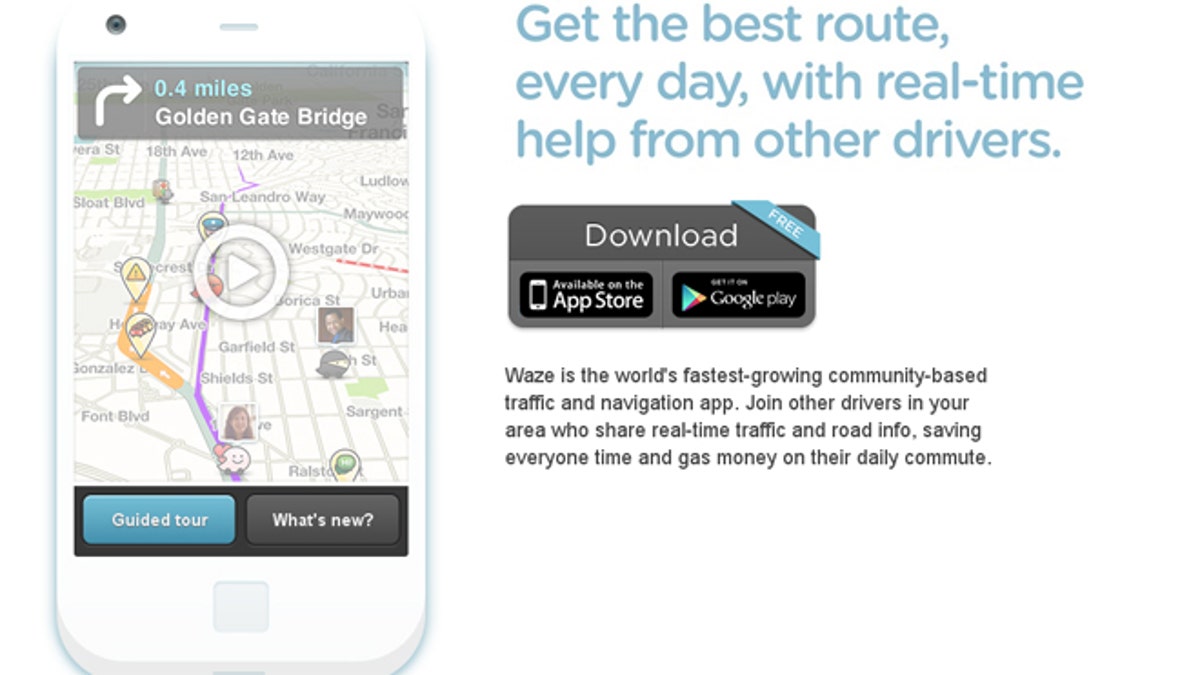
SAN FRANCISCO – Google Inc. spent $1.03 billion to outbid Facebook Inc. and Apple Inc., two of its fiercest rivals, to purchase the online mapping service Waze on Tuesday.
The deal keeps a potentially valuable tool away from Google's rivals, allowing it to gain technology that could improve the accuracy and usefulness of its own navigation system.
The acquisition ends several months of speculation as Waze flirted with potential buyers interested in its rapidly growing service. Basically, Waze blends elements of a social network into its maps to produce more precise directions and more reliable information about local traffic conditions.
Waze is based in Israel but also maintains a Palo Alto, Calif., office near all three of the Silicon Valley giants.
"We evaluated many options and believe Google is the best partner," Waze CEO Noam Bardin wrote in a Tuesday blog post.
Financial terms of the deal weren't disclosed, but The Associated Press confirmed the sale price with a person familiar with the negotiations. The person, who spoke on condition of anonymity, was not authorized to discuss the matter. Google isn't expected to disclose the price until it discusses the transaction in a formal regulatory filing.
Waze ranks as the fourth most expensive acquisition among the more than 240 deals that Google has completed in its nearly 15-year history. The only bigger purchases are Motorola Mobility Holdings for $12.4 billion last year, DoubleClick for $3.2 billion in 2008 and YouTube for $1.76 billion in 2006.
The price underscores the increasing importance of digital maps as people frequently check navigation services on their smartphones and tablet computers to help steer them in the right direction. The reliance on mobile maps creates more opportunities to show money-making ads, particularly those from local merchants. Google can also link the navigation systems to other applications to help generate more revenue.
Forrester Research analyst Julie Ask expects maps to become a main gateway on mobile devices, much like Internet search engines have been on personal computers for the past decade. "A growing percentage of time will be spent discovering, accessing and engaging content within maps," Ask predicted.
Google is the leader in the field, but both Apple and Facebook would like a bigger piece of the market.
Those ambitions are likely a key reason Google scooped up Waze, said University of Notre Dame management professor Brian Proffitt, who specializes in technology issues. "If Facebook had gotten Waze, they clearly would do something in the mobile market with it," Proffitt said. "Getting Waze is like a billion-dollar remedy to a potential headache for Google."
Apple also has been trying to improve the quality of its maps since the debut of its own navigation system last year. The maps, which replaced Google's technology as the built-in app to get directions on the iPhone and iPad, misplaced landmarks and misguided users, prompting a public apology from Apple CEO Tim Cook, along with vow to get better.
In a blog post, Google said the Waze deal had already closed. The deal didn't require government approval before it could be completed because of Waze's relatively small size. Although Waze doesn't disclose revenue, it only has about 100 employees.
But Waze has been gaining a foothold in the digital mapping market. Waze says nearly 50 million drivers in 190 countries use its mapping app to avoid traffic jams and find the fastest way to their jobs and other destinations. The service figures out the most efficient routes by drawing upon real-time information shared by about 70,000 members who help edit the maps and even provide other helpful tips, such as where to find the best gasoline prices.
In an interview during an April technology conference presented by All Things D, Waze's Bardin described his service as "the only reasonable competition" to Google in mobile maps.
Even though Google already has assumed ownership of Waze, government regulators could still review the deal to assess its effects on the mapping market.
None of Google's previous acquisitions have been blocked by regulators, although a few underwent reviews that lasted nine to 12 months.
Most of the previous regulatory inquiries have centered on Google's dominance in Internet search — a service closely linked to maps — and online advertising.
For now, Google will allow Waze to operate independently and maintain its main offices in Israel. Google, which is based in Mountain View, Calif., is taking the same tack with Motorola Mobility, which operates autonomously in Illinois.
"We're excited about the prospect of enhancing Google Maps with some of the traffic update features provided by Waze and enhancing Waze with Google's search capabilities," Brian McClendon, a Google vice president who oversees maps, wrote in the company's blog post.
Based on reporting by The Associated Press.
Follow us on twitter.com/foxnewslatino
Like us at facebook.com/foxnewslatino








































